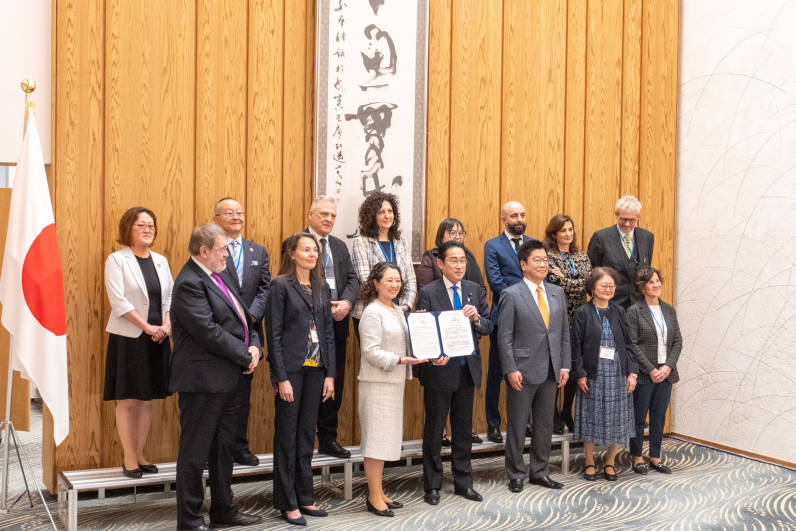G7 Labour and Employment Ministers commit to wage growth and collective bargaining
24 April 2023
G7 Employment and Labour Ministers met in Kurashiki, Japan, on 22-23 April 2023 to negotiate and adopt the Declaration ‘Investing in Human Capital’.
In a context of high geopolitical uncertainty, the cost-of-living crisis, and a global economic slowdown affecting millions of workers, it is urgent for Ministers to respond to the challenges faced by working people.
As requested by the trade unions that make up the Labour 7, G7 governments made several commitments to tackle inequalities, invest in social protection, protect workers’ rights and foster a just transition to carbon neutral economies. See the downloadable document ‘G7 Kurashiki Ministerial Declaration’.
In response to one of the Labour 7’s key demands, G7 members emphasized that “securing the labour rights of freedom of association and the right to collective bargaining is the foundation of decent work and plays an important role in promoting wage growth”. G7 Ministers further “committed to promoting appropriate improvements in working conditions, including real wage growth” and to “work with the social partners and other relevant stakeholders to promote adequate wages and help workers transition to sustainable growing and emerging sectors”. This is a welcome recognition of the critical role of collective bargaining and of the need for higher wages. However, this needs be translated into concrete actions.
“Thanks to L7’s engagement, the Kurashiki Ministerial Declaration commits to policy priorities to improve working conditions and foster more resilient and inclusive labour markets. G7 countries must now move from words to action. This entails reviewing current economic and social policies through social dialogue, including wage policies, and ratifying relevant ILO instruments, such as ILO fundamental conventions on Occupational Safety and Health”.
In a joint call issued ahead of the meeting, the Labour 7 and the Business 7 stressed that “universal and sustainable social protection systems are a crucial investment for society” and that “the G7 has a critical role in supporting low-income countries to establish social protection floors” in line with the ILO Social Protection Floors Recommendation. See the attached downloadable document ‘B7 L7 Joint Statement LEMM’.
Regrettably, the Ministerial Declaration fails to call upon international financial institutions to support this economic and social priority, nor does it provide explicit support to existing initiatives such as the UN Global Accelerator on Jobs and Social Protection for Just Transitions.
In line with a joint call issued by the Labour 7 and the Business 7 ahead of the Ministerial Meeting, G7 members recognized that while digital transformation and green transformation can “contribute to job creation, sustainability, and economic growth, they may also increase inequalities, job and income insecurity, poorer working conditions, and lead to inadequate coverage of social protection, especially for the most vulnerable”. G7 members acknowledged “the need to support workers and businesses to adapt to the changes, promote innovation and ensure a just transition at every level”.
The Labour 7 and the Civil Society 7 joined their voices ahead of the meeting to urge G7 members to actively promote the adoption of a binding, mandatory human rights and due diligence standard at the global level to put an end to child labour, forced labour, and other forms of exploitation. See the attached downloadable document ‘C7 L7 statement’.
Following this call, G7 Ministers reaffirmed the “importance of achieving human rights, decent work, and the protection of the environment in global supply chains”, as well as their readiness “to engage constructively in discussions at the UN and the ILO (…) to explore ideas and options for a consensus-based legally binding instrument at the international level”. This commitment constitutes an important step forward, and the labour movement will continue to advocate for the adoption of a much needed international standard on decent work in global supply chains.
Note
The declaration has been adopted by the Labour and Employment Ministers of the G7 countries (Canada, France, Germany, Italy, Japan, UK and USA) and the EU Commissioner for Jobs and Social Rights
For the L7 trade unions’ statement to the G7 governments in January 2023 see

